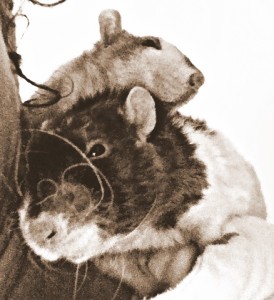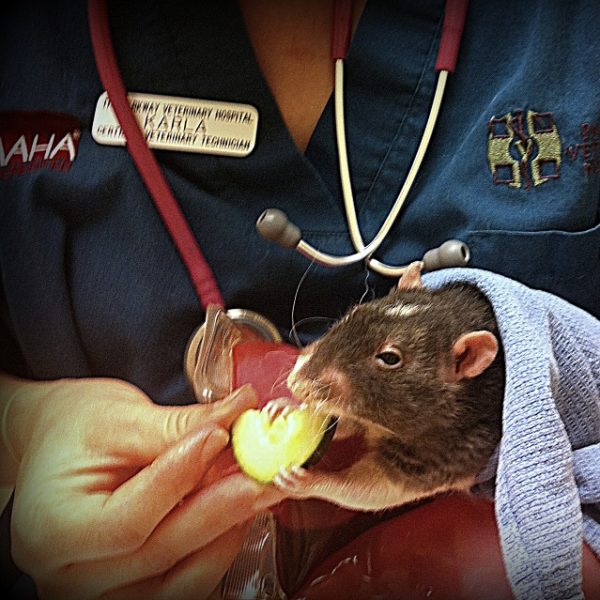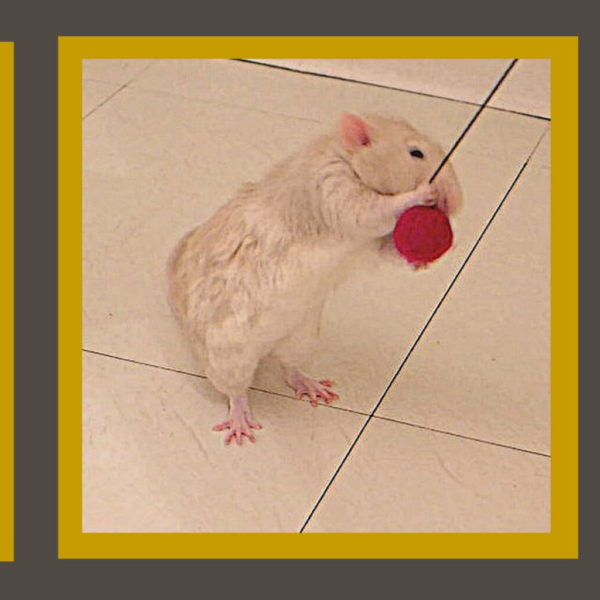Before choosing pet rats, you’ll want to decide on a few things such as
- How many rats are best to have?
- Should I get males, females or a combination of both?
- What’s the difference between getting babies vs. adults?
- What variety or type should I get?
- Where’s the best place to find pet rats?
- What are the signs of good health and temperament?

How Many?
Rats love being together. They groom each other, play together and even sleep on top of one other. This is why it’s important to have at least two rats. Some people worry they won’t be as close to their rats if they have more than one. From my experience, having two rats doesn’t hinder the development of close relationships with both rats. Most of us can’t be with our rats 24/7, so having at least two is essential. The only exceptions to this occur when your rat can’t live with other rats due to aggression, an illness or being very elderly.

What’s the limit? The most rats I’ve ever had at one time was five and, in that case, I felt like I could not get to know them as well as individuals. Personally, I like having two at a time. However, as long as you have a large enough cage, and you have the time and money it takes to care for them, having more than two rats may be enjoyable for you.
Male or Female?
 Beginning with my tenth rat, I started adopting males exclusively. I love male rat because they’re (in general) cuddlier and more responsive to developing a relationship with humans. The females frequently possess independent personalities. Unlike most males, they’re not as likely to want to sit on your lap and be petted. This is especially true when they’re young. Instead, they’re quite adventurous and even mischievous. However, I realize I’m making a gross generalization here. There are plenty of cuddly, loving females. In fact, I have two girls right now. They’re some of the lovingest rats I’ve ever had.
Beginning with my tenth rat, I started adopting males exclusively. I love male rat because they’re (in general) cuddlier and more responsive to developing a relationship with humans. The females frequently possess independent personalities. Unlike most males, they’re not as likely to want to sit on your lap and be petted. This is especially true when they’re young. Instead, they’re quite adventurous and even mischievous. However, I realize I’m making a gross generalization here. There are plenty of cuddly, loving females. In fact, I have two girls right now. They’re some of the lovingest rats I’ve ever had.
Females do generally live longer than males. They can live four or more years whereas the males live up to around three years. My longest lived male rats have lived to be three years and three months. Females develop tumors much more often than males. These can easily be removed surgically and most often are not life threatening. Spaying, especially if done when young, dramatically decreases the occurrence of mammary tumors and can contribute to longevity. The important thing here, though, is to make sure to find a veterinarian who is experienced with rat spays. (Not all are.)

Males and females can live together as long as the females are spayed and/or the males are neutered. I now believe neutering is not as essential as I used to think. As long as male rats are not aggressive and you’re tolerant of any marking behavior, leaving males intact doesn’t have the major health benefits that spaying the females has. Males do have a musky scent if unneutered and their skin may develop orange oily patches as they age. I happen to really like the muskiness of the male rats. If their scent and oilier skin is a problem from your perspective, however, neutering can alleviate these characteristics.
Babies or Adults?
Babies are so cute, it’s easy to forget they’re going to behave like babies! Often called “popcorn” since they jump around like kernels popping, they never stay still for very long. Although there are always exceptions, don’t expect to have newly adopted baby rats become cuddly, loving friends right away.
If you adopt an adult, they may bond with you fairly quickly. However, if they come from a home without much human interaction, it could take awhile for them to feel comfortable and to trust you. You can be fairly sure that any rat around nine months or older won’t be running around constantly like babies do.
I enjoy adopting adult rats because they already have a personality developed. It’s fun to get to know them, discover what they like and find areas in which you can help their confidence and personality grow. For your first rats, however, it can be easier to adopt babies. Adult rats sometimes need specialized attention, especially if they have any behavioral or medical issues. BACK TO TOP
What kind of rat?

Did you know there are Siamese, Burmese, Hairless, Rex, Dumbo and even Dalmation rats? The varieties of pet rats are fun to learn about and, in some cases, will affect their personality and health. Many believe Dumbo rats to be friendlier than other types of rats. (Dumbo rats’ ears are on the sides of their head rather than on top—similar to Walt Disney’s “Dumbo the Elephant”.) Burmese are also often considered to be very friendly. I once had Dumbo Burmese rats who were exceptionally warm and loving. Hairless rats are prone to having skin conditions and eye problems due to their lack of fur and eyelashes. Some rats, such as Rex rats, may not live as long. Again, these are all generalizations and you may certainly have a different experience with your rats.
To learn more about the many different kinds of rats, here are a two websites:
Where should I look when choosing pet rats?
Humane Society: One of my favorite places to find rats is a local humane society. Some of my most beloved rats were rescues brought to the shelter. One was taken to the humane society after being found as a baby underneath a bush in a parking lot. He had little bite marks all over his body. Because I worked at the shelter, I got to see him the day he came in. Hungry and exhausted, I held him in my hand watching him eat and fall asleep at the same time. Another shelter rat I adopted came from a hoarder with hundreds of rats, some of whom were cannibalizing one another. I was surprised to find this particular rat was the friendliest, most easy going guy even though he probably didn’t get much attention from humans.

Breeder: I had thought that getting rats from a breeder would be the best way to get the healthiest, longest living pets. I read that oftentimes breeders are able to eliminate the likelihood of mycoplasma, a very common and contagious upper respiratory infection. Over the years, I’ve had several “purebred” fancy rats from breeders. Some lived as long as rats I’d rescued in the past, some did not and ended up having significant health problems. One veterinarian I know who specializes in exotic pets said she has found Rex rats to have weakened immune systems.
Pet Stores: Pet stores may or may not be the best place from which to be choosing pet rats. It all depends on their health and how much they’ve been socialized. Medical and behavioral problems most often occur when the pet store doesn’t keep their habitats clean, uses pine or cedar litter, feeds them non-nutritional food and doesn’t handle the rats daily. In some cases, pet stores sell rats as either snake food or as pets. I once adopted some rats meant to be sold as snake food. They weren’t the friendliest rats but it did feel good to rescue them. There are some good pet stores where their rats are obtained from reputable, responsible breeders and the store staff takes good care of them until they go to their new homes.
Private Home:  Similar to pet stores, it all depends on how the rats have been raised and how well they’ve been cared for. I once adopted a pair of baby rats from an individual advertising on craigslist. Her husband bred rats for snake food and she decided she wanted to breed some of them to be pets. Not exactly an ideal situation, but the rats I adopted were very sweet although they each ended up having health problems later on.
Similar to pet stores, it all depends on how the rats have been raised and how well they’ve been cared for. I once adopted a pair of baby rats from an individual advertising on craigslist. Her husband bred rats for snake food and she decided she wanted to breed some of them to be pets. Not exactly an ideal situation, but the rats I adopted were very sweet although they each ended up having health problems later on.
No matter where you adopt your new rats from, make sure that the males and females were housed separately—unless they were spayed or neutered. Female rats can get pregnant beginning when they’re around five weeks old. Finding out you’ve adopted a pregnant female isn’t always the nicest surprise! BACK TO TOP
Choosing Pet Rats for Health and Temperament:
In terms of personality, it’s better to adopt a rat that comes right up to your hand and curiously sniffs it than one that cowers in the corner. Here are some signs and symptoms to look out for when determining whether or not the rats you’re considering are healthy:
- Porphyrin, a red secretion that looks like blood and is generally seen around a rat’s eyes and nostrils. It’s a sign that the rat could have mycoplasma or another sort of upper respiratory infection. Rats who are stressed will also often have porphyrin around their eyes and nose.
- Another sign to look for when choosing pet rats is the health of the rat’s fur. Is it shiny and well-groomed or is the coat disheveled, dirty or dull? If a rat isn’t grooming itself, this could be because it’s not feeling well.
- Is the rat sneezing? If so, this is another symptom of a possible upper respiratory infection.
- How about the rat’s physique? Does it look excessively skinny or extra plump?
It’s better to start out with a healthy rat when choosing pet rats unless you’re prepared to take on the added challenge. BACK TO TOP
For more information on choosing exotic pets in general, check out Uncommon Pets: Tips for Proper Care at Home from Experts on porch.com.








Thanks for providing positive information about rats to those who are new to their care. Dumbo describes a “variety” of rat, not a breed. We have found them to have the same engaging personality as the top-eared rat. All rats are incredible beings. <3
Hi Paige,
Thank you for your feedback and comments. I really appreciate your stopping by!
I love what you do for ratties, too! Your facebook page, Rat Haven, is wonderful.
Best Wishes to You & Your Rats,
Jasmine | About Pet Rats
Hi,
I’m intrigued by having an animal that size trusting and loving up to a person.
My question is, are African Giant Pouched rats available here in Australia?
Cheers, Michael
Hi Michael,
I am not well-versed on whether or not there are African Giant Pouched rats available for adoption in Australia. I would suggest doing a search on Facebook. There are groups on Facebook dedicated to African Giant Pouched rats. Even if they’re not based in Australia, if you join the group you can post expressing your interest and there may be someone in that type of group who could help you.
Before even looking for a Gambian Pouched rat, though, I’d make sure there’s a veterinarian near where you live who is knowledgeable and able to examine and treat this type of rat. It would be terrible to find one to adopt and then not be able to care for it properly if there aren’t any qualified vets nearby.
I’m sorry I can’t be more helpful. I really do think posting within related Facebook groups could be beneficial, though.
Take Care,
Jasmine | About Pet Rats
Hi! I really want rat(s) and (i’m a child) I think I could convince my mom, but my dad strongly dislikes rodents. especially rats. Is there a way I could change his mind, or have a solution (such as have a rat room that he doesn’t have to go in)? Having a rat room that he doesn’t have to go in is my only idea, so I would love to hear from you. Thank you!
Hi Isabelle,
I’m sorry I haven’t been able to respond to you sooner. I do have some ideas for you, though, if you’re still struggling to convince your parents. You can find them in my post Getting Your First Pet Rats: Parental Persuasion In Three Not-So-Easy Steps.
After you read that post, if you still have questions, don’t hesitate to let me know. I hope to be able to respond much more quickly in the future.
Thinking positive for you!
Jasmine | About Pet Rats
Would it be possible to domesticate wild rats and keep them as pets? Thanks in advance
Hi Shree,
Many people have successfully kept wild rats as pets. By “successfully”, I mean that the rats were able to live high quality lives and the humans were able to enjoy having them. That said, it’s ideal for a wild rat to stay in the wild.
If you’ve found wild rats that for some reason are not releaseable, then yes it’s absolutely possible to keep them as pets. They won’t behave like domesticated rats, though. You will likely find that they are more active and less affectionate.
Let me know if you have any other questions and/or need any clarification.
Jasmine | About Pet Rats
I’ve had pet rats my whole life but only Rex. Every Rat I’ve had has died of some kind of infection. I Was wondering if this was bc of having Rex rats or is it normal 🤔. I love Rex rats but am thinking about getting different breed what would be like a Rex in behavior but without the infection issues?
Hi There, Rex Lover!
I love Rex rats too. I have had vets tell me that Rex rats are more prone to getting sick. In general, I have found that purebred animals—even dogs and cats—are more likely to get diseases. That said, my longest living male rats were Burmese rats. (They lived to be 3 years and 3 months.) I loved the Burmese rats’ personalities.
I have to say, though, that I think every single rat has the potential to have a fantastic personality. I believe that a lot of their personality comes from how much we interact with them. Also, how much intellectual stimulation we provide makes a big difference.
The other thing to keep in mind is that just about every rat is born with mycoplasma (or respiratory disease). Not all rats exhibit symptoms even if they’re carrying the disease. So the other way you could approach your selection is by checking to make sure whichever rats you adopt don’t already have porphyrin, have been raised in an environment that’s been kept super clean and dust free. Then, after adopting them, if there are any improvements you can make to what type of litter you use as well as your cage cleaning methods and/or schedule, this could possibly help keep them healthier longer.
I hope you find at least some of these ideas helpful. Thanks for asking your question!
Jasmine | About Pet Rats
I am looking for 2 rats for me and my wife we have both had rats in the past we don’t know where to get them can you help
Cheers
Rat very Longtail
Ps it’s my real name changed it by deed poll many years ago.
Hi There, Rat!
I mention in the above page all of the different options of places for finding pet rats. Besides breeders, humane societies, pet stores and private homes, you can also do searches on local craigslist and pet rat facebook pages.
I apologize for taking so long in which to respond. I’ve been taking care of 2 very sick rats along with working full-time. I’m just now catching up with responding to everyone from the past few months. If you have any other questions in the future I hope to be able to respond much more quickly.
Hope you’ve found your new rats by now. That’s great you’re looking to add them back into your lives.
Take Care,
Jasmine | About Pet Rats
This is all so helpful thank you.
I am a single parent with two children(8 and 10). Both children are desperate for rats!! And finally I have caved in.
I have done months of research and decided
– dumbo rats
– male
But, here’s my questions:
1. I am very house proud. Is it inevitable they are going to smell? What can I do to lesson aside from cleaning religiously? Or is it inevitable?
2. Are males substantially smellier and I understand they dribble urine a lot? If so, will neutering deal with this?
3. Where best to position the cage? Very limited choice as small flat. Will the TV room be ok? This is where the children and I spend times the evenings until about 8ish – it can be noisy with the TV and the children play in there. Therefore it can be quite noisy. But only until 8ish. That ok?
Huge thanks!
Hi Georgina,
Thanks for asking your excellent questions! Ages 8 and 10 are wonderful ages for having rats.
Here are my responses:
1) Cleaning your rats’ cage is the #1 way to keep your house from smelling. I have 2 posts on this that address cleaning their cage and reducing odors: Cleaning Your Pet Rats’ Cage and A Common Scents Guide to Banishing Pet Rat Cage Odor. Reading both of these will really be helpful. Also, I always tell parents not to leave it up to their kids for all of the cage cleaning. Children just don’t understand the importance of keeping the cage clean and there’s no way they would be thorough enough to properly keep the cage clean. You can definitely have them help you clean the cage. They could also each be responsible for one or two of the many tasks involved in keeping the cage clean. (Examples would include changing the water bottles, picking up old food and putting new food in the cage, emptying litter boxes at a specified time during the day, etc.)
2) An article I wrote that specifically addresses your questions in #2 is Are Male Pet Rats Messier & Do They Urine Mark?. As I state in this article, it really is possible to train male rats not to mark—-as long as you have the patience and discipline to do so.
3) The TV room sounds like it could work well for your new rats’ cage. It would depend on how loud you play your TV and how loud your kids are when they play. For example, do they “shriek” when they play? Any high pitched, extraordinarily loud sounds would be stressful for new rats. I’m wondering if you can tell your children to be more careful (and quieter) while your new rats are getting acclimated? It’s ideal to have the cage located in a room in which your family members spend a lot of time. I can’t tell from what you wrote if your TV room is used throughout the day or only at night and only occasionally during the day. For more information on cage location and getting to know your new rats, I’ve written How to Bond with Your New Rats in 3 Easy Steps.
Hope you don’t mind my referring you to different articles on my website. I specifically wrote these articles to answer the questions you’ve been asking. It’s so great that you’re doing this research. Rats are so much fun and they do require a bit of learning. I would also be sure to familiarize yourself with pet rat health concerns and the importance of finding a great veterinarian—if you haven’t already done so.
Don’t hesitate to let me know if you need any other information. Thanks again for asking all of your great questions.
Best Wishes to You & Your Future Rats,
Jasmine | About Pet Rats
I was told my rat was neutered and I thought that, but now I read this(a year after he passed on) I now know why his skin was orange and oily. we had to give him baths which he loved (and of course with warm water and gentle soap that was safe for him)and dried him up and also put a little bit of coconut oil on his skin because his skin was also a little dry. so now I know he was not neutered and that is why there were sack looking things by his tail
Hi Ella,
Thanks for your comment. That’s amazing you were told your rat was neutered. It’s so hard to know these types of things unless someone teaches you or you do some research!
Speaking of the sack-like looking things by his tail: I worked in veterinary hospitals for years. One family brought in their pet rat thinking it had 2 tumors—one on each side of the base of it’s tail.
I’m impressed that your rat liked being bathed. Most rats don’t like it that much. It sounds like you took such great care of him.
Thanks again for sharing!
Jasmine
Hi! I’ve been hoping to get a pair of rats for a while, but my parents are not very keen on the idea. One of the major issues is that they disapprove of keeping animals in cages. But personally I don’t see that as a problem as long as the rats are well taken care of and happy, especially if I let them out of the cage regularly. Is there any way I can change my parents’ mind on this?
Hi Lissel,
First of all, you sound like you have very cool parents. It’s great that they’re against keeping animals in cages since it means that they must really care about them. You raised a good point, too, that you can definitely take your rats out of the cage on a regular basis.
I do have some suggestions on how you can convince your parents to allow you to get pet rats. In fact, I have a complete post on this very topic:
Getting Your First Pet Rats: Parental persuasion in 3 not-so-easy steps.
I hope you find the post on parental persuasion helpful. After you read it, feel free to let me know if you have any additional questions anytime.
One more thing: Regarding your parents not liking the idea of any pets being kept in cages, you can let them know it’s to keep them safe. Pet rats can get into a lot of trouble and even get hurt or lost if they’re not in cages. Plus you can make their cage into a palace. They love building nests and inside their cage is the best place to do this! (Better inside their cage than inside your parents’ couch!)
Thinking positive for you,
Jasmine | About Pet Rats
I was thinking of having two female rats but after I have read this website I am confused about having two males or two females? Also which breed is better Burmese or Dumbo?
Hi There,
Thanks for asking your questions. It’s totally a personal preference as to whether to adopt males or females. The chart in my post is there to help you understand the differences between the two. Is there anything in particular that’s confusing you about getting females or males?
Regarding Burmese vs. Dumbo, there are Burmese Dumbo rats. (“Dumbo” refers to the position of a rat’s ears and can be seen in all varieties of rats including Burmese.) I wouldn’t get too hung up, though, on choosing what variety of rat you want. Usually, there aren’t a lot of options from which to choose depending on where you live and what types of breeders are in your area. It’s just great to be familiar with the different kinds of rats so, when faced with a choice, you’ll know which one you prefer.
I hope this is helpful. If not, feel free to ask more questions. That’s great that you’re doing your research!
Take Care,
Jasmine
Hi, so I was looking into getting a couple pet rats and had some questions. First off i want smaller male rats, what breed do you reccomend? Secondly I am only fourteen and am lacking on funds do you know cheap habitat options? Thank you!
Hi Connor,
Thanks for your great questions!
Most male rats are usually not smaller unless they’re dwarves. (And dwarves are not that easy to find unless there’s a breeder of them in your area.) Also, from my experience, when looking for pet rats there may not always be a large selection of varieties from which to choose. Do you know if you’ll be getting your rats from your local humane society or from a breeder? Or from craigslist or facebook or a pet store?
There aren’t specific breeds of rats but there are varieties. In case it’s helpful to know: In the United States, the American Fancy Rat & Mouse Association (AFRMA) recognizes 7 varieties of rats. Within each of those varieties there are various colors and markings. The 7 varieties are: Standard, Rex, Satin, Dumbo, Tailless, and Bristle Coat and Hairless.
In terms of finding a “cheap habitat option” I noticed there are some really good deals on pet rat cages on eBay right now. However, I must say that rats are really not inexpensive pets. They can have a lot of medical issues so it’s important to have money available to be able to take them to the vet.
Are your parents supportive of your getting pet rats? Just in case it’s helpful, I have a post and a worksheet that help you plan ahead for getting your first pet rats. (This post and worksheet are also designed to impress your parents with how well you’ve prepared for getting your rats.)
Let me know if you have any other questions. Looks like you’re doing a great job of researching before getting your rats!
Jasmine | About Pet Rats
Hi! So I’m considering getting pet rats, either two males or two females, and I know that they still have prey instincts and I’m a bit worried that might be a problem because I also have a pet corn snake. (I’m a lover of exotic animals!) So my question is, will they be stressed if they can smell the snake? I’m currently moving into a new home, and my snake isn’t here yet, should I get them before the snake gets here so they can acclimate? They would be in the same room, but on opposite sides.
Hi Jolee,
I myself have never had snakes as pets so I can’t speak from firsthand experience. I did a little research online, though, and there seem to be lots of people who have both snakes and rats who live successfully in the same room. (…..while, of course, being housed separately from one another.)
As to whether your rats should live in the room before you move in your snake, that’s hard to say. It might be just as easy to move your snake and then get your rats since the rats will already be adjusting to a new home anyways. I think it would be better for your new rats to have to adjust to their new surroundings once rather than moving into a room in which they begin feeling safe and then find that a snake is moved into the same room.
The other thing to be super careful of is to make sure your snake’s enclosure is very secure. I’m sure you’ve thought of this but it doesn’t hurt to mention it.
Good luck with your move and with your new rats. Don’t hesitate to let me know if you have any other questions.
Jasmine | About Pet Rats
Hi! I’m not especially well versed in rat care, but I am fairly well versed in snakes!
I think that while it is definitely possible to keep rats and snakes in the same room, I wouldn’t recommend it. This actually isn’t because of the rat – speaking from experience, as long as they don’t actually see the snake on a regular basis, they don’t seem to mind. The snake, however, will likely smell the rat, which can be stressful for the snake. It also tends to elicit a feeding response, which makes it much more difficult to handle the snake and tends to make them irritable.
I can’t speak to whether you should get one or the other first, but I would recommend putting them in different rooms if possible.
I am also aware that this response is a bit late, so hopefully all is well!
Thanks for making your very helpful comments, Hail. I’ll contact Jolee to make sure she sees what you wrote.
Take Care,
Jasmine
I have been looking into rats, I am thinking of two females, because I do not want the smell of the males, but the only problem is I want a cuddly rat as well. Is there a type of female that would be more cuddly, or does it depend on the rat?
Hi Naomi,
I’ve had rats for 30 years now and haven’t had a female rat I’d call “cuddly”. I do have a female rat right now who kisses a lot, though. There are some breeds of rats known as being friendlier such as Rex or Burmese, but I’m not sure if the females would be extra friendly or not. I’ve had male Rex and Burmese rats and they were some of my cuddliest rats.
One thing that really does make a difference in a rat’s personality is how much they are handled as babies. No matter which sex you end up choosing, it is best to find rats who’ve been well socialized with lots of human interaction and handling.
If you really want cuddly rats, I’d suggest you get males. You can have them neutered. However, I’ve had unneutered males who didn’t smell at all. If they do smell it could be because their cage isn’t being cleaned enough. Some unneutered males do develop buck grease as adults and some people (such as myself) actually like their muskier scent.
If you need any clarification or have any other questions about choosing your rats, don’t hesitate to ask. I’d say if your goal is cuddly, though, you really do want to get males.
I’m excited to hear you’re looking into getting rats….you’re going to love them!
Best Wishes,
Jasmine | About Pet Rats
Hi! Me and my teacher are looking to get a pet rat to have in the classroom. I was wondering what kind of rat would be the best for that and/or some tips/advice for doing so.
Hi Ana,
That’s great you’re researching ahead of time what’s involved with having pet rats in your classroom. I noticed you asked about getting “a” rat. You definitely need to get at least two rats. Rats need the company of other rats since they play and sleep together as well as groom one another.
The main things to consider when planning for first-time pet rats are time and money. You need to make sure you have enough of each so that you’re able to provide and care for your rats responsibly.
TIME
Here’s a list of things you’ll want to make sure you have the time for…
– Playing and visiting – ideally a couple of hours each day with your rats outside of their cage
– Cage cleaning
– Small amount of time needed for preparing fresh meals and any needed medications later on down the line.
– Veterinary care – someone will need to take your rats to a veterinarian who’s knowledgeable about and experienced with pet rats. Initially this will be for a new pet exam but, later on, you’ll want to have them examined regularly whether or not you think they’re sick.
– Learning – You’ll want to familiarize yourself about pet rat behavior as well as common signs of illness.
– Someone should bring your rats home over the weekend as well as during any school holidays. They should not be left alone for days.
MONEY
These are the things for which you’ll want to make sure you have enough money:
– Cage
– All that goes inside the cage – bedding, litter boxes, toys, wheel. (If on a tight budget, see It’s What’s Inside that Counts…)
– Veterinary care
For more detailed information on the time and money aspects of having pet rats, see Parental Persuasion in Three Not-So-Easy Steps. Even though you’re not trying to convince your parents, the concepts discussed are pertinent to your research. In fact, in the second paragraph, you’ll find a link which leads you to a worksheet you can utilize while preparing to get your first rats.
As for what type of rats, you definitely want to look for rats who are both friendly and healthy. See above section “How to Choose for Health & Temperament” for how to make sure you’re choosing healthy rats. The rats who are usually the most friendly are those who are handled often. Ideally want to choose two from the same litter since you’ll know they’re already used to being together. Starting off with young rats is usually easiest when they’re your first pair of rats. Adults going to a new home can sometimes be a little more tricky if you’re not already familiar with pet rat health and behavior.
Again, I want to commend you on doing your research ahead of time. You’re going to be much better prepared because of the knowledge you’ll gain.
I hope this information is helpful for you. Don’t hesitate to let me know if you have other questions or need any clarification.
Best Wishes,
Jasmine | About Pet Rats
Hello! Im here because my rat just had babies!!! (So apparently im not so good at determaning the sex of a rat!) And im determaning witch rat babies I should keep i have 1 dumbo baby (PLS be a girl) and the rest are albino raties witch little raties should i keep? The mom is albino and unfoutanaly the daddy must go bye bye?… At least he gets to leave with 2 of his children (he WILL forget he even had them he dosnt get to see them HE WILL TRY TO GET THE MOM PREGO AGEIN AND THATS A NONO!!!) And he will get to live with old owner!!!!??the only reason he moved in with me his because his friend passed away…???
Hi Kyelee,
Thanks for your comment. I’m sorry to hear your rat had an unplanned pregnancy. I hope you’re able to find great homes for the ones you’re not able to keep.
Keep in mind that male rats as young as 5-weeks-old can impregnate female rats. To tell the sexes apart, observe the distance between their genitals and anus. Males have about twice the distance compared to females. Males’ testicles can develop as young as at 3 weeks of age. Once they’re fully grown, a rat’s testicles are quite large—you can’t miss them! :)
In case it’s helpful to know, an albino rat is called a “PEW” which stands for “Pink-Eyed White”.
Hope everyone is doing well!
Jasmine | About Pet Rats
Hello, I’m considering a rat (rats) as a pet. You mentioned Dumbo rats being the most effectionate. Are Dumbos more or less effectionet than African Pouch Rats?
I did further research and learned that the African Pouch Rats, although have successfully been trained for illness and bomb detection and could make nice pets, they are not officially domesticated animals. Dumbo rats are an officially domesticated breed.
If you have any further insight, please pass it along. Thank you.
Hi There, Antonio!
I’m glad to hear you’re looking into getting pet rats! That’s great you’re doing your research as there’s so much to consider and plan for before bringing home your family members.
I don’t have any personal experience with Gambian pouched rats. From what I’ve read, they do seem like they’d be more difficult to socialize with humans. And yes, it’s pretty amazing about the organization Apopo and how they’ve trained Gambian pouched rats to detect landmines and tuberculosis!
If you’re looking for affectionate temperaments, I’d definitely choose male rats over females. As far as Dumbo vs. standard-eared rats, I really do believe it’s more likely to depend on how the rats are raised and socialized than on their appearance.
A good way to choose rats for temperament is to see how they behave when you first meet them. If they’re outgoing and eager to greet you then they’re more likely to be friendly and able to bond with you. On the contrary, rats who hide inside a box or behind all the other rats will take more time and work before they’re able to relax and become close with you.
Let me know if you have any other questions. Best wishes on finding your new friends!
Jasmine | About Pet Rats
I have 2 female rats that I have had for over a year now, but they are now starting to get violent and hurt and bite each other. What should I do?
Hi Maggie,
The first thing to determine is whether or not your girls are actually fighting (rather than playing and/or establishing dominance). Descriptions of how to tell each of these behaviors apart can be found in Play, Tiff or Clash? | Understanding Pet Rat Relationships.
If there is any blood being shed then you’ll probably want to separate them—at least for the short term.
Here are things to observe so you can help figure out why they’ve begun behaving violently toward one another:
• Are one or both of your girls in heat when the aggression occurs? (You can tell they’re in heat when they arch their rear ends and/or wiggle their ears. The ear wiggling is very rapid so that it almost looks like their ears are vibrating.)
• Is one rat behaving more aggressively than the other?
• When are they becoming aggressive? Are they inside their cage? Outside the cage during free roam time? Is it when they are being given treats?
I always think it’s a good idea to have pet rats examined regularly by a veterinarian who’s knowledgeable about and experienced with pet rats. This helps initially by establishing a baseline of what’s “normal” for your rats making it easier to recognize changes when they occur later on. Your veterinarian can also often find problems you may not have noticed. It could be you didn’t notice because it’s a problem with which you’re unfamiliar. Another reason you may not have realized your rat is ill is because it’s in the very early stages. Veterinarians are well trained and experienced in recognizing conditions before they’re in advanced stages. This generally makes it both easier to treat and less expensive. Good rat veterinarians are also quite knowledgeable about pet rat behavior. They can give behavioral recommendations after thoroughly examining your rats to rule out any possible medical conditions.
If they are fighting when they’re in heat AND if they are actually shedding blood, then spaying may be a good option for changing their behavior. You can read important details about spaying in Spaying & Neutering Your Pet Rats.
I hope at least some of these ideas are helpful. If you need any clarification or want to share additional details, don’t hesitate to let me know.
Good luck resolving this difficult issue. I wish there was an easy solution. However, resolving this type of behavioral issue is dependent on so many specific, individualized factors. I do hope you’re able to take them to a vet to help figure out what your girls’ particular issues are. I’d love to hear an update if you feel like writing again.
Best Wishes to You & Your Rats,
Jasmine | About Pet Rats
It’s, so funny, when you describe them, they are so simular to dogs, I also feel like male dogs are cuddlier!
A lot of new information here for me!
Love x
Hi Valerie!
That’s interesting that in your experience male dogs are cuddlier just like with rats. Pet rats are the perfect combination of dogs and cats: They groom themselves, play and can be litter box trained just like cats. They come when called, learn tricks and want to please you just like dogs. Who could ask for anything more?!
Thanks for stopping by and for commenting. :)
Jasmine | About Pet Rats
I love rats! My husband does not, so I don’t have any right now. I always get females because the giant male genitalia grosses me out. I know that’s not very nice, but that’s how I feel. I didn’t realize there were so many different varieties. I always got the black and white hooded rats. I also discovered that if I get them young and hand raise them it turned out to be really good companions. I think they’re much better than hamsters! unfortunately some people can’t get past the tail. I think it’s cute, but some people are just weird.
Hi Kelley,
Has your husband ever been around rats? He might be more accepting if he had the chance to see how adorable rats are. Seeing them groom their faces, hold food in their hands while they’re eating—little behaviors such as these are quite endearing to the uninitiated. :)
Males and females are so different from one another. I love them both but have to say it’s wonderful to have males since they usually love cuddling and being petted.
Yes, those testicles are BIG! My first rat was male and I was afraid to get him neutered because I thought it would cause him to lose his balance. (This was way back in 1990!)
Speaking of rat tails, I’m not sure if you saw my post Tail Tales yet.
Thanks so much for stopping by and sharing some rat love!
Best Wishes to You & Your Furry Friends,
Jasmine | About Pet Rats